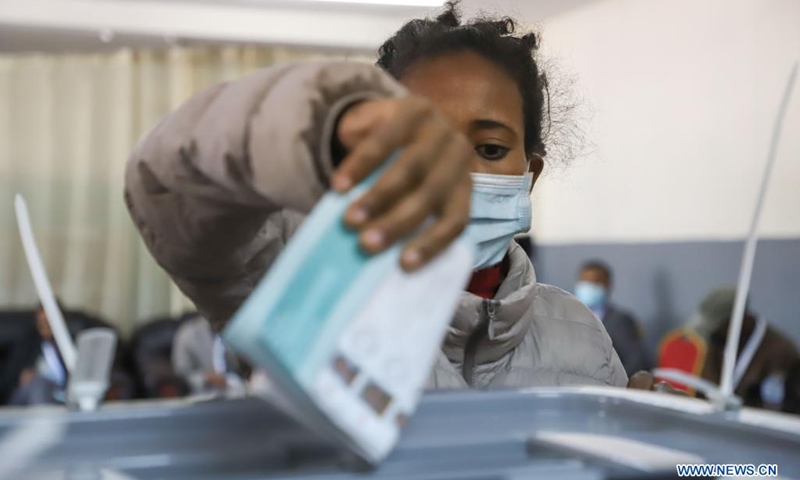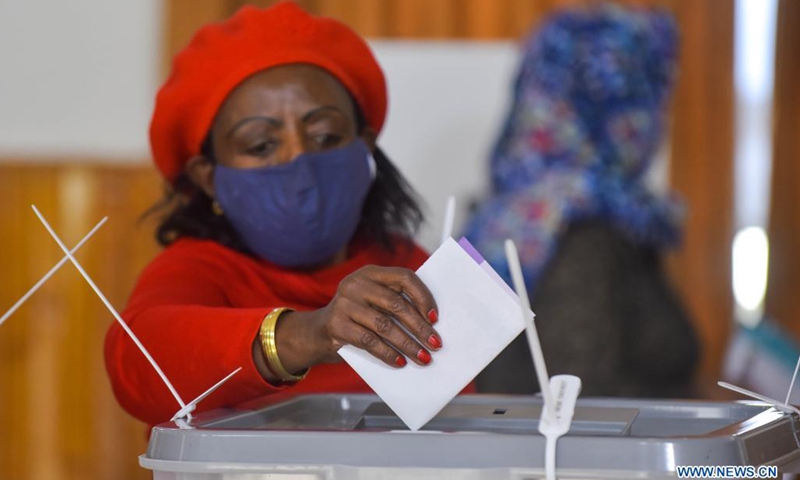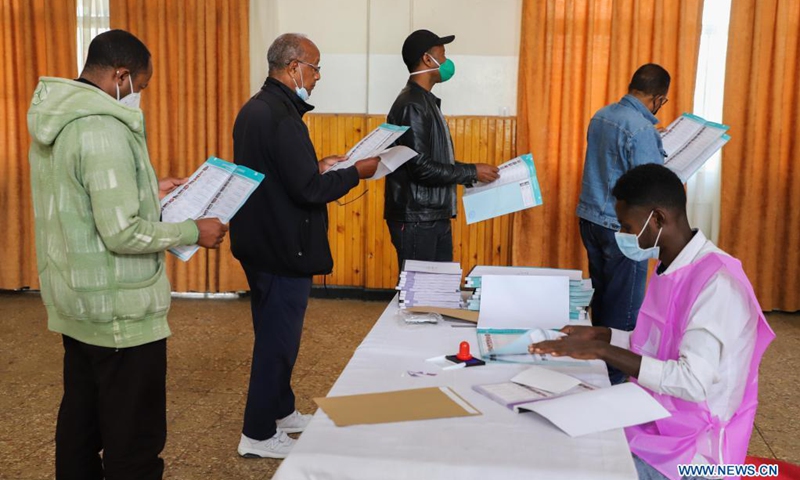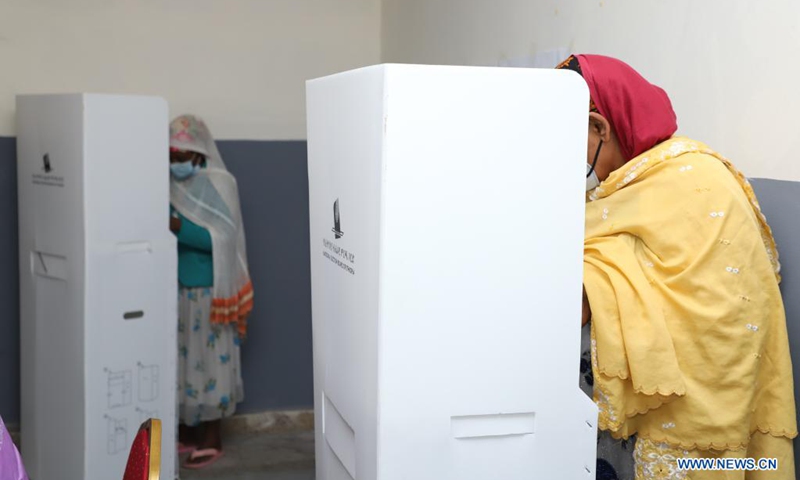
A voter casts her ballot at a polling station in Addis Ababa, Ethiopia, on June 21, 2021. Voters went to the polls in Ethiopia on Monday for the twice delayed sixth general elections. Millions of Ethiopians are voting their representatives, both for the House of Peoples' Representatives (HoPR) - the lower house of the Ethiopian parliament, as well as for the regional state councils as more than 9,000 candidates run at the federal and regional levels.(Photo: Xinhua)

A voter casts her ballot at a polling station in Addis Ababa, Ethiopia, on June 21, 2021. Voters went to the polls in Ethiopia on Monday for the twice delayed sixth general elections. Millions of Ethiopians are voting their representatives, both for the House of Peoples' Representatives (HoPR) - the lower house of the Ethiopian parliament, as well as for the regional state councils as more than 9,000 candidates run at the federal and regional levels.(Photo: Xinhua)

Voters are seen at a polling station in Addis Ababa, Ethiopia, on June 21, 2021. Voters went to the polls in Ethiopia on Monday for the twice delayed sixth general elections. Millions of Ethiopians are voting their representatives, both for the House of Peoples' Representatives (HoPR) - the lower house of the Ethiopian parliament, as well as for the regional state councils as more than 9,000 candidates run at the federal and regional levels.(Photo: Xinhua)

Voters are seen at a polling station in Addis Ababa, Ethiopia, on June 21, 2021. Voters went to the polls in Ethiopia on Monday for the twice delayed sixth general elections. Millions of Ethiopians are voting their representatives, both for the House of Peoples' Representatives (HoPR) - the lower house of the Ethiopian parliament, as well as for the regional state councils as more than 9,000 candidates run at the federal and regional levels.(Photo: Xinhua)
Voters went to the polls in Ethiopia on Monday for the twice delayed sixth general elections.
Millions of Ethiopians are voting their representatives, both for the House of Peoples' Representatives (HoPR) - the lower house of the Ethiopian parliament, as well as for the regional state councils as more than 9,000 candidates run at the federal and regional levels.
The elections are being held in seven of the 10 regional states, with voters expected to choose candidates vying for 440 of the 547 HoPR seats in the east African country, according to the National Election Board of Ethiopia (NEBE).
Including in the conflict-affected Tigray regional state, the election was postponed for 107 of the 547 parliamentary seats due to violence, and irregularities and defects in ballot papers.
The election for some of the constituencies is now rescheduled for Sept. 6.
The government has promised to hold a free, fair, and credible election for voters to choose candidates from 46 regional and national parties.
Alem Sisay, 62, who arrived at a polling station at the Akaki neighborhood on the outskirts of the capital, Addis Ababa, before voting started at 6:00 a.m., told Xinhua correspondents that she came to vote for the betterment of her country.
Another voter, 27-year-old Adisu Lemma, was also waiting for his turn among a large crowd in the Kaliti neighborhood.
"This is my first time voting. I came here early in the morning to exercise my right and vote for a party that I believe will lead the country and my city to a better path," Lemma told Xinhua.
Preliminary results of the voting are set to be announced within five days.
At the federal level, the political party or coalition that wins the majority in the 547-seats HoPR will form a government, and approve the appointment of the prime minister and the council of ministers. At the regional state level, the party or coalition capturing a majority of seats in the council gets to appoint the regional head and regional cabinet members.
Ethiopia's ruling Prosperity Party is running for the first time in its current stature. In 2019, three of the four members of the former ruling coalition, the Ethiopian People's Revolutionary Front (EPRDF), dissolved the EPRDF and formed the Prosperity Party.
The ruling party, which is widely expected to win the polls, competes with the main opposition party, the Ethiopian Citizens for Social Justice led by veteran politician Berhanu Nega. Various regional and ethnic political parties are also competing across the regions and in the capital, Addis Ababa.
The election was held amid challenges like recurrent conflicts in parts of the country and the COVID-19 pandemic, which prompted the NEBE to move the date of the balloting from the initially scheduled August 2020 to June 5 this year and then to Monday, June 21.
While fears linger over a repetition of violence seen in 2005 after Ethiopia's third general election, many believe that it is less probable this time around as elections are delayed in fragile areas.
Experts also argued that the promise and assertion by the government to hold a credible and fair election is facilitating the electoral process despite global and domestic challenges.
